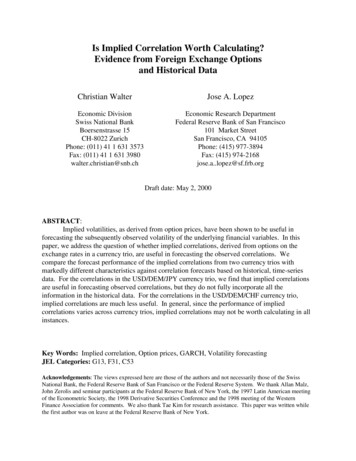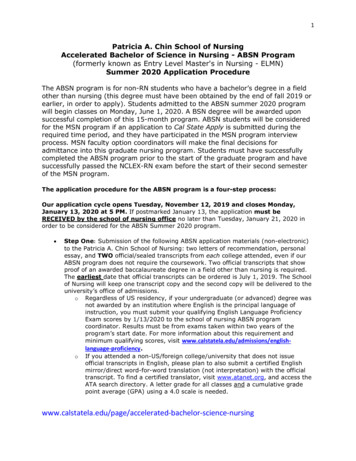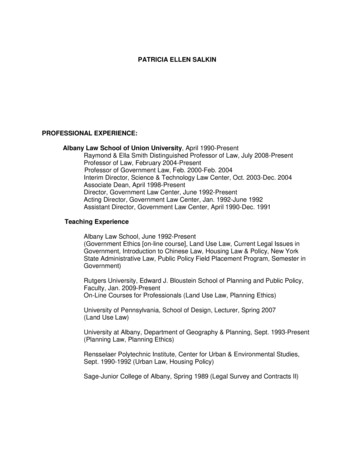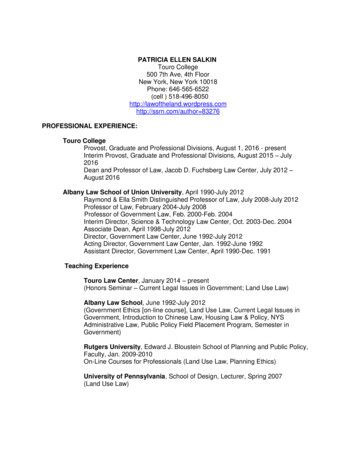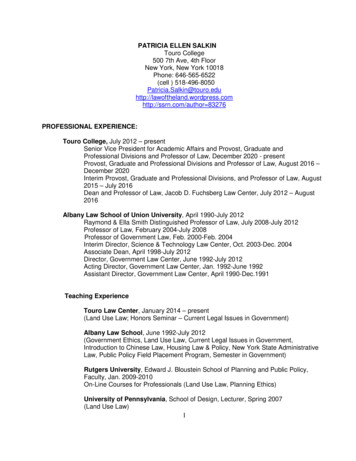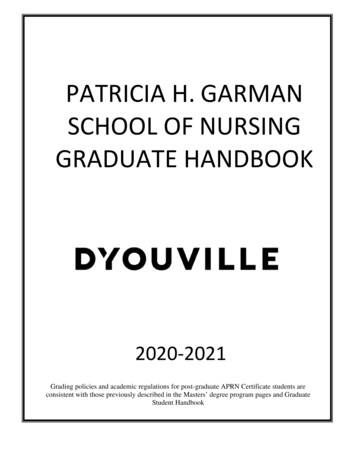
Transcription
PATRICIA H. GARMANSCHOOL OF NURSINGGRADUATE HANDBOOK2020-2021Grading policies and academic regulations for post-graduate APRN Certificate students areconsistent with those previously described in the Masters’ degree program pages and GraduateStudent Handbook
3TABLE OF CONTENTSTable of ContentsTABLE OF CONTENTS . 3GENERAL INFORMATION . 4OVERVIEW OF THE PROGRAMS . 4MISSION AND VISION . 4OUTCOMES OF GRADUATE PROGRAMS . 9COMMUNICATION . 11PROFESSIONALORGANIZATION . 12COMMITTEES. 13COURSE REQUIREMENTS . 13COURSE PRE- or CO-REQUISITES . 13ACADEMIC REGULATIONS . 16ACADEMIC POLICIES . 20ADMISSION CRITERIA . 21APPENDIX A . 35APPENDIX B . 41Appendix C . 43
4GENERAL INFORMATIONThe Graduate Nursing Handbook is designed to provide graduate nursing studentswith specific information about the policies and procedures specific to D’Youville’sgraduate nursing programs. Other publications and announcements provide additionalimportant information for all D’Youville students. It is the responsibility of eachstudent to obtain these publications as they become available. The policies in thishandbook apply to both on campus and distance formatted programs.OVERVIEW OF THE PROGRAMSSeveral graduate programs in nursing are offered. Current program options include aMaster of Science in Nursing as a Family Nurse Practitioner, Psychiatric-MentalHealth Nurse Practitioner, Nursing Management & Quality Leadership, and NursingEducation with a Clinical Focus. See Doctor of Nursing Practice Handbook fordoctoral offerings. Emphasis of the Family Nurse Practitioner program is on managinghealth care of individuals across their lifespan. Emphasis of the Psychiatric-MentalHealth program is to prepare clinicians to provide psychotherapy and pharmacotherapyto individuals, families, and groups across the lifespan.The Nurse Practitioner programs can also be completed as post graduate certificateoptions to qualified candidates. Graduates of the Nursing Management & QualityLeadership will be specifically prepared to lead the team and/or ensure thatinpatient, outpatient, and community settings provide safe and competent care todiverse populations. Nursing Education with a Clinical Focus candidates areprepared to be knowledgeable about teaching principles and skilled clinicaleducators.MISSION AND VISIONMissionEducate competent, compassionate, knowledgeable, professional nurses whoprovide patient- directed healthcare to a culturally and spiritually diverse populationin a variety of settings without setting limits or parameters in its scope ofcompassionate care.VisionPreparing future nursing professionals to work collaboratively to transform healthcare.
5PhilosophyThe School of Nursing shares beliefs about the major concepts of patient, health,society, nursing care and nursing roles in the health care system and education.The patient or recipient of nursing care may be an individual, family, group(aggregate), or community. Nurses consider support and personal belief systems andother environmental or cultural influences when delivering care.Nursing is a primary health care profession that exists to promote, maintain, and restorethe health, well- being, and quality of life (including, when necessary, nurturing apeaceful death) of all people, irrespective of socioeconomic class, age, sex, lifestyle,health status, religion, ethnicity, and/or cultural background.The nursing profession is a constitutive component of a larger complex healthdelivery system, which in turn exists within a great complex society. Nursing practiceis therefore influenced by internal professional values and the societal, environmental,educational, religious, cultural, legal, economic, and political values and forces of theexternal health care system.Nursing care (the art and science of nursing) is an expression of nursing, scientific, andhumanistic knowledge, which has as its intention and foundation, compassionate humanconcern and caring as core moral values. As professionals, nurses are accountable tothemselves, patients, the nursing profession, and society. At the professional andsocietal levels, nurses advocate socially and politically for changes in the health caresystem that will produce a healthier society, improve nursing, and advance and preservehuman dignity and self-determination. Community based and community health nursingare interwoven in the very fabric of our society and nurses deliver care in hospitals,clinics, nursing homes, patient homes, schools, workplaces, crises sites, and a multitudeof other community and organized health care settings. Nursing provides essentialhuman services and those services should be directly available to the public, particularlythe underserved, wherever and whenever human health care needs exist.Nurses contribute and function in roles at multiple levels (e.g., primary health care)within the complex health care system. They contribute their professional knowledgeand skills through providing direct patient care as well as shaping and influencing thegreater system by utilizing management and leadership skills. As direct careproviders, nurses in partnership with their patients and other health care professionals,plan, deliver, and evaluate nursing care directed towards facilitating healing andwholeness. Nurses promote self-responsibility and empowerment through teachingand counseling.These services assist patients in clarifying personal beliefs, values, and perceptionsabout health, quality of life, and treatment decisions or choices available. Because thesedecisions may have profound implications, nurses must be insightful about moral andethical issues and know how to advocate effectively for patients. As case managers and
6members and leaders of the health care team, nurses identify and measure processes andoutcomes of care. They plan how care can be delivered in ways that promote bothquality and cost effectiveness, and coordinate and manage staff in the delivery of care.The primary role of nursing educators is to assist students in acquiring knowledge andskills that will allow them to have a strong professional identity and to be able to delivercreative, compassionate, humane, and flexible nursing care in an ever-changing healthcare delivery system. Learning is greatly enhanced when the relationship betweenstudent and faculty is an interactive partnership, with the faculty functioning asfacilitator. Students must be prepared to function competently in multiple roles andmultiple settings. This expectation demands that students acquire a broad liberal arts andscience foundation; develop interpersonal and communication skills; learn to thinkcritically and creatively; interpret, utilize, and support research efforts; problem solve;evaluate their own learning needs; and become lifelong learners.We further believe that the level of sophistication of application of nursingknowledge varies with the obtained level of education and skills of each individual sothat:1. Baccalaureate education is viewed as preparation for the nurse to function as ageneralist with a comprehensive approach to health care within both acute careand community settings. The entry level to professional practice is thebaccalaureate degree.2. Graduate education is focused on the refinement of the knowledge andpractice base acquired through baccalaureate nursing education. This level ofeducation is viewed as the foundation for a wide variety of advanced practiceroles, including clinical nurse specialists and nurse practitioners.PATRICIA H. GARMAN SCHOOL OF NURSING LEADERSHIP TEAMDean – Dr. Christine Verni, EdD, FNP-BC, APRNDr. Verni is responsible for the oversight and organization of the School of Nursingunder the leadership of the Vice President of Academic Affairs. Dr. Verni setsacademic excellence standards, oversees program development and evaluation, andsupervises accreditation of the program. Dr. Verni can be reached through herAdministrative Assistant at 716-829-7856.Assistant Dean - Dr. Denise Dunford, DNS, FNP-BC, ENP-BC, APRNDr. Dunford is responsible for the oversight and organization of the School ofNursing under the leadership of the Dean. Dr. Dunford assists the Dean with allacademic matters, providing leadership while fostering collaboration, andcorporation of all nursing faculty to ensure all curricula are current and consistentlydelivered in a manner that achieves superior student outcomes while promoting themission of the school of nursing and D’Youville. Dr. Dunford can be reachedthrough her Administrative Assistant at 716-829-7856.
7Chair of Graduate Nursing- Dr. Christine Nelson-Tuttle,Dr. Nelson-Tuttle serves as the liaison between graduate students and the faculty,supervising all academic activities of the graduate programs offered by the School ofNursing. Students who wish to contact the Chair of Graduate Nursing may do sothrough the School of Nursing Graduate Secretary at 716-829-7783.Chair of Undergraduate Nursing- Dr. Michelle BorkDr. Bork serves as the liaison between undergraduate students and the faculty,supervising all academic activities of the undergraduate programs offered by theSchool of Nursing. Students who wish to contact the Chair of Undergraduate Nursingmay do so through the School of Nursing Undergraduate Secretary at 716-829-7613.Director of Family Nurse Practitioner Prog – Prof. Rebecca Roloff, FNP-BC, MS, APRNProfessor Roloff oversees the FNP program. Students who wish to contact Professor Roloffmay do so through the Graduate Secretary at 716-829-7783.Director of the RN-BSN Program – Professor Kendra Schmitz, MSN, RNProfessor Schmitz oversees the RN-BSN program within the School of Nursing.Students who wish to contact Professor Schmitz may do so through the School ofNursing Undergraduate Secretary at 716-829-7613.Director of the Psych-Mental Health Nurse Practitioner Program- Interim Dr.Denise DunfordDr. Denise Dunford oversee the Psychiatric Mental Health Nurse PractitionerProgram. Students who wish to contact Dr. Dunford may do so through the GraduateSecretary at 716-829-7783.Director of the Nursing Management and Quality Leadership Program- ProfessorColleen Dowd, MSN, RNProfessor Dowd oversees the Master of Science Nurse Management andQuality Leadership program. Students who wish to contact Professor Dowdmay do so through the Graduate Secretary at 716-829-7783.Director of Nursing Education with a Clinical Focus – Dr. Susan LombardoDr. Lombardo oversees the Master of Science Nursing Education with a Clinical Focusprogram. Students who wish to contact Dr. Dunford may do so through the GraduateSecretary at 716-829- 7783.The School of Nursing will be a leader in educating nurses who will be advocates forchange within the health care system, promote a healthier society, improve nursingpractice, and preserve and enhance human dignity and self-determination.The School of Nursing shares beliefs about the major concepts of patient, health,society, nursing care and nursing roles in the health care system and education.The patient or recipient of nursing care may be an individual, family, group(aggregate) or community. Nurses consider support, personal belief systems and
8other environmental or cultural influences when delivering care.Nursing is a primary health care profession that exists to promote, maintain, andrestore the health, wellbeing, and quality of life (including, when necessary, nurturinga peaceful death) of all people, irrespective of socioeconomic class, age, sex, lifestyle,health status, religion, ethnicity, and/or cultural background.The nursing profession is a constitutive component of a larger complex health caredelivery system, which in turn exists within a great complex society. Nursingpractice is therefore influenced by internal professional values and the societal,environmental, educational, religious, cultural, legal, economic, and political valuesand forces of the external health care system.Nursing care (the art and science of nursing) is an expression of nursing, scientific,and humanistic knowledge, which has as its intention and foundation, compassionatehuman concern and caring as core moral values. As professionals, nurses areaccountable to themselves, patients, the nursing profession, and society. At theprofessional and societal levels, nurses advocate socially and politically for changes inthe health care system that will produce a healthier society, improve nursing, andadvance and preserve human dignity and self- determination. Community based andcommunity health nursing are interwoven in the very fabric of our society and nursesdeliver care in hospitals, clinics, nursing homes, patient homes, schools, workplaces,crises sites, and a multitude of other community and organized healthcare settings.Nursing provides essential human services and those services should be directlyavailable to the public, particularly the underserved, wherever and whenever humanhealth care needs exist.Nurses contribute and function in roles at multiple levels (e.g., primary health care)within the complex health care system. They contribute their professional knowledgeand skills through providing direct patient care as well as shaping and influencing thegreater system by utilizing management and leadership skills. As direct careproviders, nurses in partnership with their patients and other health care professionals,plan, deliver, and evaluate nursing care directed towards facilitating healing andwholeness. Nurses promote self-responsibility and empowerment through teachingand counseling. These services assist patients in clarifying personal beliefs, values,and perceptions about health, quality of life, and treatment decisions or choicesavailable. Because these decisions may have profound implications, nurses must beinsightful about moral and ethical issues and know how to advocate effectively forpatients.As case managers and members and leaders of the health care team, nurses identifyand measure processes and outcomes of care. They plan how care can be delivered inways that promote both quality and cost effectiveness, and coordinate and managestaff in the delivery of care.The primary role of nursing educators is to assist students in acquiring knowledge andskills that will allow them to have a strong professional identity and to be able todeliver creative, compassionate, humane, and flexible nursing care in an ever-changing
9health care delivery system. Learning is greatly enhanced when the relationshipbetween student and faculty is an interactive partnership, with the faculty functioning asfacilitator. Students must be prepared to function competently in multiple roles andmultiple settings. This expectation demands that students acquire a broad liberal artsand science foundation; develop interpersonal and communication skills; learn to thinkcritically and creatively; interpret, utilize, and support research efforts; problem solve;evaluate their own learning needs; and become lifelong learners.We believe that the level of sophistication of application of nursing knowledge varieswith the obtained level of education and skills of each individual so that:1. Baccalaureate education is viewed as preparation for the nurse tofunction as a generalist with a comprehensive approach to health carewithin both acute care and community settings. The entry level toprofessional practice is the baccalaureate degree.2. Graduate education is focused on the refinement of the knowledge andpractice base acquired through baccalaureate nursing education. This level ofeducation is viewed as the foundation for a wide variety of advanced practiceroles.3. Doctor of Nursing Practice involves in-depth research adding to theknowledge base obtained at the Masters’ level and the DNP is perceivedas a terminal degree.OUTCOMES OF GRADUATE PROGRAMSGraduates of the Masters’ programs will be able to:1. Use advanced theoretical and empirical nursing knowledge as thefoundation for advanced nursing practice.2. Demonstrate expertise in nursing diagnosis and treatment responsesnecessary for promoting, maintaining, and/or restoring health ofindividuals, families, groups, and/or communities3. Practice as culturally competent advanced practice clinicians in a variety ofhealth care settings4. Evaluate proposed new methods for providing safe, efficient, and costeffective nursing care, including informatics, to meet societaldemands5. Demonstrate leadership roles in advanced nursing practice6. Participate in research to improve nursing practice, quality of care, andimprove patient outcome7. Demonstrate a commitment to advancement of the nursing profession
108. Demonstrate advanced communication skills through professionalpresentations and publications9. Demonstrate moral, ethical, legal, political, environmental, and economicprinciples applicable to advanced nursing practice10. Embrace a plan for professional growth and lifelong learningADDITIONAL COMPETENCIES FOR FNP MS/CERT. PROGRAMS1. Competently obtain patient history2. Perform comprehensive and focused physical examinations3. Develop appropriate differential diagnoses4. Prescribe treatment plans5. Evaluate patient responses to treatment6. Determine the effectiveness of careADDITIONAL COMPETENCIES PMHNP MS/CERT.PROGRAMS1. Completely obtain histories for individuals, families, and groupsto perform comprehensive mental health assessments2. Perform advanced clinical skills in psychotherapy modalities3. Develop appropriate diagnoses including the ability to diagnosemental health conditions and comorbid medical disorders4. Treat acute and chronic psychiatric disorders and conditions.5. Prescribe treatment plans in concert with client concerted care perspective6. Evaluate responses to treatment for individuals, families, and groups7. Determine the effectiveness of care including psychotherapymodalities and pharmacologic interventionsOutcomes of Nursing Management and Quality Leadership1.Demonstrate leadership roles in various healthcare organizations2.Utilize evidence-based practice to assist the healthcare team, patients,and other stakeholders
113.Analyze information to develop strategies to improve patient outcomes whichcould include quality & safety, cost containment, leadership, and organizationalresponsibilities4.Implement a leadership environment that supports the healthcare team,patients, and stakeholders5.Use leadership theoretical nursing knowledge to advance as a leaderOutcomes of Nursing Education with a Clinical Focus1.Apply knowledge from the basic, social, and nursing science literature toplan and implement quality educational programs.2.Possess a deeper understanding of the relationship between the theoreticalunderpinnings of teaching pedagogies and the application of these concepts inclinical settings.3.Develop competence in designing and implementing curricular techniquesacross the spectrum of health care settings to include academia, clinics,organizations, community care models4.Collaborate on inter-professional teams to assure quality nursing education5.Initiate appropriate teaching strategies to achieve health care outcomesworking with patients, families, groups, organizations, and communities.COMMUNICATIONPUBLICATIONS AND ANNOUNCEMENTSD'Youville’s Calendar, Planner, and Resource ces/docs/student-resource-guide.pdfThe CatalystThe Catalyst is the student newspaper. It provides a forum for students to express theiropinions and keeps students informed of current campus issues. It is published monthlyand is available in offices and racks throughout the campus.The School of Nursing newsletter, “The Pulse”, is published monthly andavailable electronically.Administrative AnnouncementsAnnouncements and letters are available electronically to keep the D’Youville communityinformed.
12E-mail AccountsAll registered students are assigned a D’Youville e-mail account. Students arerequired to sign into their account and create a password. This is imperativebecause official online communications between faculty and student willoccur via the D’Youville email address only. If assistance is needed, contactthe Academic Computing Center.CatalogProgram and course descriptions for all graduate programs, are listed inthe catalog. http://www.dyc.edu/catalog/current/Publications provide access to much of the information students need within theSchool of Nursing.Other valuable sources of information for nursing students:1. Sigma Theta Tau, Zeta Nu Chapter (Nursing HonorSociety) - https://www.sigmanursing.org/2. Student Nurses Association – Information located inthe student lounge – located on the 5th floor of the AltBuilding3. The Graduate Nursing Forum is the School of Nursing’s online forumused for communications to students. Students should check theGraduate Nursing Forum several times each week for updates andannouncements.THE SCHOOL OF NURSING FAX NUMBERThe School of Nursing FAX number is 716-829-8159. Should any documentationneed to be faxed, please use a cover page identifying to whom the fax is intended for.PROFESSIONALORGANIZATIONSIGMA THETA TAU, ZETA NU CHAPTER, NURSING HONOR SOCIETYIn 1979 Sigma Theta Tau, the National Honor Society of Nursing wasintroduced at D’Youville. The Zeta Nu Chapter was charted in 1981. Zeta Nu isdedicated to the advancement of nursing as a profession and a science, and tothe goal of nurses assuming leadership positions in research, scholarship, andpublic policy.Qualifications for Graduate Student Membership1. Sigma Theta Tau International does not discriminate. Candidates arequalified for membership so long as eligibility requirements are met.2. Student candidates shall have demonstrated superior academicachievement, academic integrity, and professional leadershippotential.
13a. Definition – Graduate program is defined as an accreditedprogram of graduate study in nursing including master, postmaster, doctoral, and post- doctoral.b. Academic Achievement – Students in graduate programs shall beeligible for membership if they have achieved excellence according tothe standards approved by the Society and Zeta Nu Chapter. Graduatestudents must obtain an overall GPA of 3.5 and have completed 25%of their graduate program.c. Exceptions – Exceptions may be made at the discretion of thechapter’s governance committee following the guidelines adoptedby the International Board of Directors.Membership is open to all faculty, alumni nurse leaders, and students meeting therequirements. Zeta Nu collaborates with other local Sigma Chapters and District 1NYSNA in sponsoring an annual research conference.COMMITTEESStudent Membership on CommitteesThe D’Youville School of Nursing believes that student representation on School ofNursing committees fosters progress toward program outcomes by opening anadditional forum for faculty-student communication.The role of the graduate student representative is important, providing a uniqueopportunity for students' views to be heard, considered, and acted upon in an officialforum. By assuming this responsibility, students join with faculty members andadministrators in making decisions that form the policies and procedures of graduateprograms.Student representatives should be able and willing to serve for one academic year.Students selected should be in good academic standing. Students may selfnominate.Graduate Nursing Faculty CommitteeThis Committee includes graduate nursing faculty and one graduate nursing student.The committee meets regularly to advise on program concerns and to recommendcurriculum and academic policy revisions pertaining to the graduate nursingprogram.COURSE REQUIREMENTSCourse requirements for specific nursing programs can be found in the currentedition of the D’Youville Catalog http://www.dyc.edu/catalog/current/ .COURSE PRE- or CO-REQUISITESSome courses have no prerequisites. Others must be taken in a particular order. Still
14others should be taken at a particular time. By checking the Catalog description of acourse, it is possible to find out if there are any necessary prerequisites. Prior toregistering, students meet with academic advisors. The following list includes thecommon advice given to students in the School of Nursing.Family Nurse Practitioner (FNP)CourseRequirementsNUR 600No Pre-requisiterequired NUR 601 No Prerequisite requiredNUR 631Pre-requisite: Completion of a baccalaureate-level health assessmentcourse or equivalent; Active, unencumbered RN license in New YorkState or Ontario. Co-requisite: NUR 631LNUR 631LPre-requisite: Completion of a baccalaureate-level health assessmentcourse or equivalent; Active unencumbered RN license in New Yorkstate, or Ontario.Co-requisite: NUR 631NUR 632Pre-requisite: Completion of a baccalaureate-level pharmacologycourse or equivalentNUR 633Pre-requisite: Completion of a baccalaureate-level pathophysiologycourse or equivalentNUR 634Pre- requisite: NUR 631/631L; Pre or co-requisite:NUR 632, NUR 633;NUR 635Pre- requisite: NUR 631/631L; Pre or co-requisite:NUR 632, NUR 633;NUR 637Pre- requisite: NUR 631/631L; Pre or co-requisite: NUR 632, NUR 633NUR 638Pre- requisite: NUR 631, NUR 631L, NUR 632, NUR 633, Pre-req:NUR 634NUR 639Pre- requisite: NUR 631. NUR 631L, NUR 632, NUR 633. Pre-req:NUR 635NUR 640Pre- requisite: NUR 631, NUR 631L, NUR 632, NUR 633, NUR 637NUR 641Pre- requisite: NUR 640.Project Option:NUR 610Pre-requisite: NUR 600 and NUR 601NUR 629Pre-requisite: NUR 610Family Nurse Practitioner Post-Graduate CertificateAn individualized Gap Analysis will be done upon acceptance into the post-graduatecertificate program. Students will follow the same course pre- and co-requisites asabove under FNP.Psych-Mental Health Nurse Practitioner (PMHNP)Course RequirementsNUR 600No Pre-requisiterequired NUR 601 No Pre-
15requisite requiredNUR 631Pre-requisite: Completion of a baccalaureate-level health assessmentcourse or equivalent; Active, unencumbered RN license in New YorkState or Ontario. Co-requisite: NUR 631LNUR 631LPre-requisite: Completion of a baccalaureate-level health assessmentcourse or equivalent; Active unencumbered RN license in New Yorkstate, or Ontario. Co-requisite: NUR 631NUR 632Pre-requisite: Completion of a baccalaureate-level pharmacologycourse or equivalentNUR 633Pre-requisite: Completion of a baccalaureate-level pathophysiologycourse or equivalentNUR 672Pre or Co- requisite: NUR 632NUR 673Pre or Co- requisite: NUR 633NUR 706Pre-req: NUR 631/631L. Pre or co-req: NUR 632 and NUR 633NUR 707Pre-requisite: NUR 631, NUR 631L, NUR 632, NUR 633, NUR 672, NUR673.NUR 708Pre- req: NUR 631, NUR 631L, NUR 632, NUR 633, NUR 672, NUR 673,and NUR 707NUR 714Pre- requisite: NUR 706, NUR 632, NUR 633. Pre or co-requisite: NUR 672and NUR 673.NUR 715Pre- requisite: NUR 707NUR 716Pre- requisite: NUR 708 andNUR 715 Project Option:NUR 610Pre-requisite: NUR 600 and NUR 601NUR 629Pre-requisite: NUR 610.Psych-Mental Health Nurse Practitioner Post-Graduate CertificateAn individualized Gap Analysis will be done upon acceptance into the post-graduatecertificate program. Students will follow the same course pre- and co-requisites asabove under PMHNP.Nursing Management & Quality LeadershipCourseRequirementsNUR 600No Pre-requisite requiredNUR 601No Pre-requisite requiredNUR610Pre-requisite: NUR 600 and NUR 601NUR 613No Pre-requisite
16NUR 614NUR 615NUR 621NUR 629NUR 650NUR 651NUR 652No Pre-requisitePre-requisite: NUR 613 and NUR 614Pre-requisite: NUR 613 NUR 626 No Pre-requisitePre-requisite: NUR 610Pre-requisite NUR 613Pre-requisite: NUR 613No Pre-requisiteNursing Education with a Clinical FocusCourseRequirementsNUR 600No Pre-requisiteNUR 601No Pre-requisiteNUR 610Pre-requisite: NUR 600 and NUR 601NUR 613No Pre-requisiteNUR 616No Pre-requisiteNUR 617Pre-requisite: NUR 616NUR 618Pre-requisite: NUR 616 and NUR 617NUR 619Pre-requisite: all didactic course workNUR 627Pre-requisite: NUR 616NUR 629Pre-requisite: NUR 610NUR 631Completion of a BSN health assessment course or equivalentCo-Req: NUR 631LNUR 631LCo-requisite NUR 631.NUR 632Pre-requisite: Completion of a baccalaureate-level pharmacology course orequivalentNUR 633Pre-requisite: Completion of a baccalaureate-level pathophysiology courseor equivalent
The School of Nursing shares beliefs about the major concepts of patient, health, society, nursing care and nursing roles in the health care system and education. The patient or recipient of nursing care may be an individual, family, group (aggregate), or community. Nurses consider support and personal belief systems and
